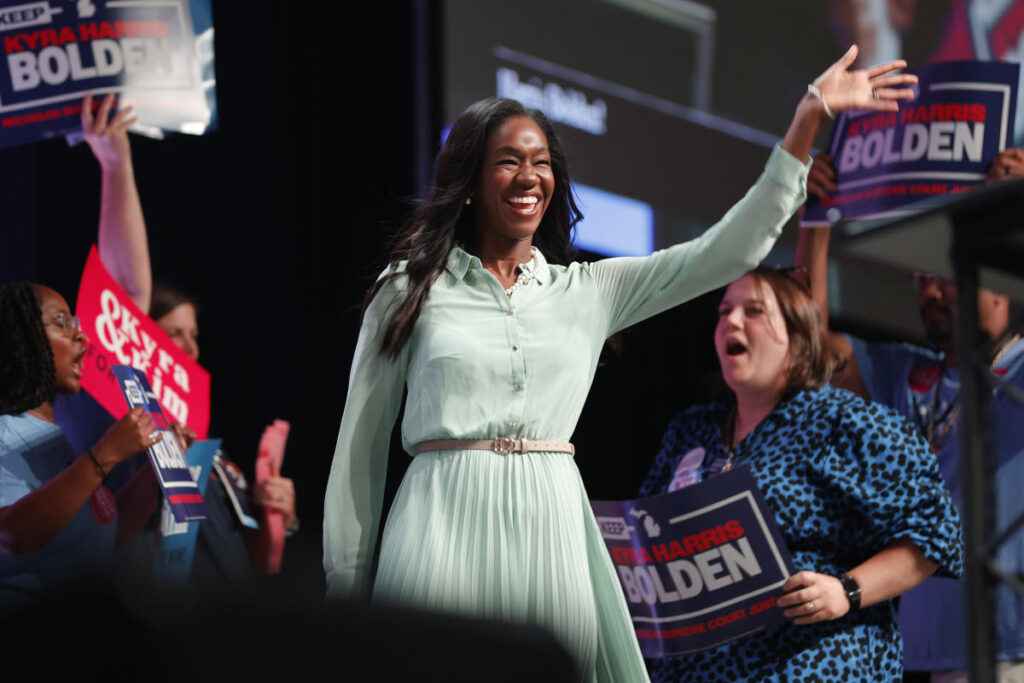In the recent Michigan Supreme Court elections, the political landscape is characterized by heightened tensions as Democrats and their allies strive to maintain their fragile majority amidst aggressive campaigning and high financial stakes. Currently, the Democratic-backed justices hold a narrow 4-3 lead, and Republicans are intent on seizing control of the judiciary, which has seen significant Democratic influence over the past two years. With both available seats pivotal for this shift in power, the election is seen as a critical confrontation between the two parties. Candidates in these races, while ostensibly nonpartisan, are closely affiliated with their respective parties, with nominations occurring through party conventions rather than direct party affiliations on ballots.
The race for the seat occupied by Justice Kyra Harris Bolden, appointed by Democratic Governor Gretchen Whitmer in 2022, highlights pivotal issues of representation and experience. Bolden, who would make history as the first Black woman elected to the Michigan Supreme Court if victorious, faces Republican-supported Judge Patrick O’Grady. O’Grady’s campaign is built on his extensive experience in law enforcement and as a judge, aiming to appeal to voters seeking a “law and order” perspective. His candidacy comes amid broader Republican claims that the current court is excessively liberal, seeking to reverse what they characterize as judicial overreach in favor of progressive policies. The dynamic between O’Grady and Bolden underscores the significance of personal narratives in judicial elections, where qualifications and experiences take center stage.
In parallel, the contest for the seat vacated by Justice David Viviano features critical ideological matchups as well. Republican nominee Andrew Fink faces off against Democratic law professor Kimberly Anne Thomas for a full-term seat on the bench. Thomas has allied closely with Bolden following their party nominations, indicating a strategic partnership aimed at energizing the Democratic base. Meanwhile, Fink joins the chorus of Republican voices asserting that electing him would restore balance to the court, addressing concerns about alleged liberal judicial activism. This competition reflects broader regional sentiments concerning the role of the judiciary and the perceived need for a more balanced representation of viewpoints.
Central to the election’s narrative is the issue of reproductive rights, particularly in the context of the recent constitutional amendment that secured abortion rights for Michigan voters in 2022. Democrats have framed the election not only as a contest of candidates but also as a crucial moment for the future of abortion rights in the state. They argue that the composition of the court could fundamentally impact rulings on reproductive issues, painting this election as a battleground for maintaining recently established rights. Conversely, Republicans have countered this discourse by asserting that the amendment serves as a definitive safeguard against any potential rollbacks on abortion access. This clash over reproductive rights forms a significant part of the ideological battle, influencing voter perceptions and election outcomes.
As the campaign progresses, outside spending influences have played an essential role in shaping candidate narratives and voter engagement, further amplifying the stakes involved. The substantial financial resources poured into the race — by both state parties and independent spending groups — have turned the judicial elections into a flashpoint for larger political battles reflective of national issues. With both sides mobilizing significant financial backing, ads and campaigning strategies are focused on framing opponents in a light that resonates with core supporters. This environment underlines the increasing polarization of judicial elections, where campaign messaging often intertwines with broader social and political movements.
In conclusion, the Michigan Supreme Court elections encapsulate the broader struggle between Democratic and Republican ideologies as both parties vie for control over a powerful judicial system that has pronounced implications for voters’ rights and social policies. The significance of these elections is magnified by ongoing debates surrounding reproductive rights, the role of the judiciary, and the importance of judicial independence versus partisanship. As campaigns draw to a close, both sides must navigate the complexities of voter concerns and organizational support, making these elections a crucial test of political strength and influence within the state’s legal landscape.

